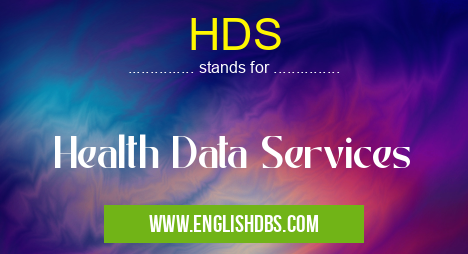What does HDS mean in HEALTHCARE
Health Data Services (HDS) is a comprehensive term encompassing services and solutions related to the collection, management, analysis, and utilization of health-related information. HDS plays a crucial role in improving the quality and efficiency of healthcare delivery, research, and population health management.

HDS meaning in Healthcare in Medical
HDS mostly used in an acronym Healthcare in Category Medical that means Health Data Services
Shorthand: HDS,
Full Form: Health Data Services
For more information of "Health Data Services", see the section below.
» Medical » Healthcare
What is HDS?
HDS involves:
- Data Collection: Gathering health information from various sources, such as electronic health records (EHRs), patient portals, wearables, and other health information systems.
- Data Management: Storing, organizing, and securing health data to ensure its integrity and accessibility.
- Data Analysis: Applying statistical, epidemiological, and other analytical methods to extract insights and patterns from health data.
- Data Utilization: Using health data to inform decision-making, improve patient outcomes, advance research, and enhance population health.
Components of HDS
HDS typically includes the following components:
- Data Infrastructure: The hardware, software, and network resources necessary for data storage, management, and processing.
- Data Integration: Combining health data from multiple sources to create a comprehensive view of patient health.
- Data Analytics Tools: Software and algorithms used for data analysis, including statistical modeling, predictive analytics, and machine learning.
- Data Governance: Policies and procedures for ensuring the security, privacy, and ethical use of health data.
Benefits of HDS
HDS offers numerous benefits, including:
- Improved Patient Care: Provides clinicians with timely and accurate health information to make informed decisions and enhance patient outcomes.
- Advanced Research: Facilitates large-scale research studies and clinical trials to identify risk factors, develop new treatments, and improve population health.
- Personalized Medicine: Enables the development of tailored healthcare plans based on individual patient characteristics and genetic profiles.
- Reduced Healthcare Costs: Helps identify and address inefficiencies, optimize resource allocation, and reduce unnecessary procedures.
Conclusion
Health Data Services (HDS) is an essential component of modern healthcare. By providing comprehensive data management and analysis capabilities, HDS enables the delivery of high-quality care, advances medical research, and promotes population health. As the healthcare industry continues to evolve, HDS will play an increasingly important role in shaping the future of healthcare delivery and improving the lives of patients worldwide.
Essential Questions and Answers on Health Data Services in "MEDICAL»HEALTHCARE"
What is Health Data Services (HDS)?
Health Data Services (HDS) is a specialized service that provides secure storage, management, and analysis of health-related data. It enables healthcare providers, researchers, and other stakeholders to access, share, and utilize health information for improved patient care, research, and policy development.
What types of health data does HDS handle?
HDS manages various types of health data, including electronic health records (EHRs), patient demographics, laboratory results, imaging studies, medication data, and genomics information. By integrating data from multiple sources, HDS provides a comprehensive view of patients' health, facilitating better informed decision-making.
How does HDS ensure data security and privacy?
HDS employs robust security measures to protect sensitive health data. It adheres to industry-standard encryption protocols, access controls, and monitoring systems. Data is stored in secure data centers, and strict policies govern data access and usage. Privacy regulations, such as HIPAA and GDPR, are meticulously followed to ensure patient information remains confidential.
How can healthcare providers benefit from using HDS?
Healthcare providers leverage HDS to improve patient care through:
- Enhanced access to comprehensive patient health data
- Streamlined communication and collaboration among providers
- Data-driven insights for personalized treatment plans
- Efficient tracking of patient outcomes and quality of care metrics
- Reduced administrative burden and improved workflow
How does HDS contribute to research and innovation in healthcare?
HDS plays a crucial role in advancing healthcare research:
- Facilitates access to large, de-identified datasets for clinical trials and epidemiological studies
- Enables data sharing and collaboration among researchers
- Supports the development of innovative diagnostic and treatment methods
- Contributes to the understanding of disease mechanisms and patient outcomes
HDS also stands for: |
|
| All stands for HDS |
